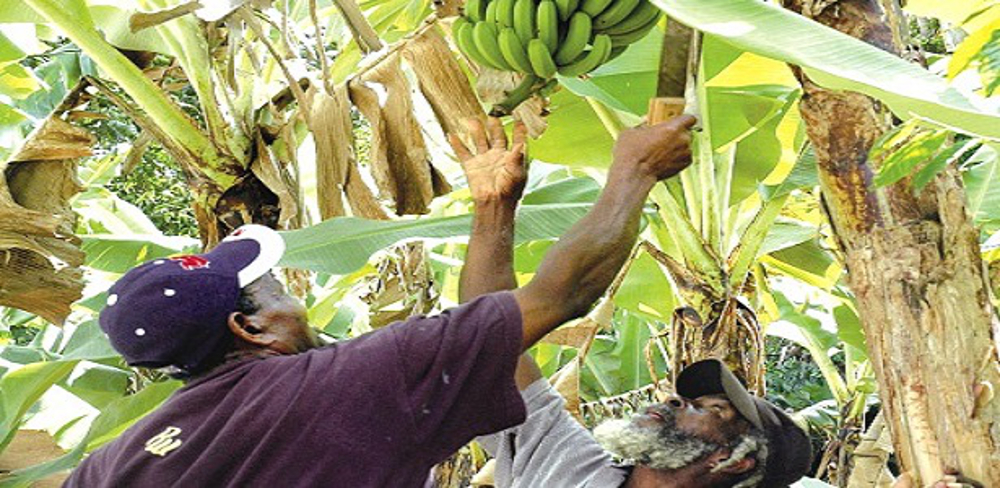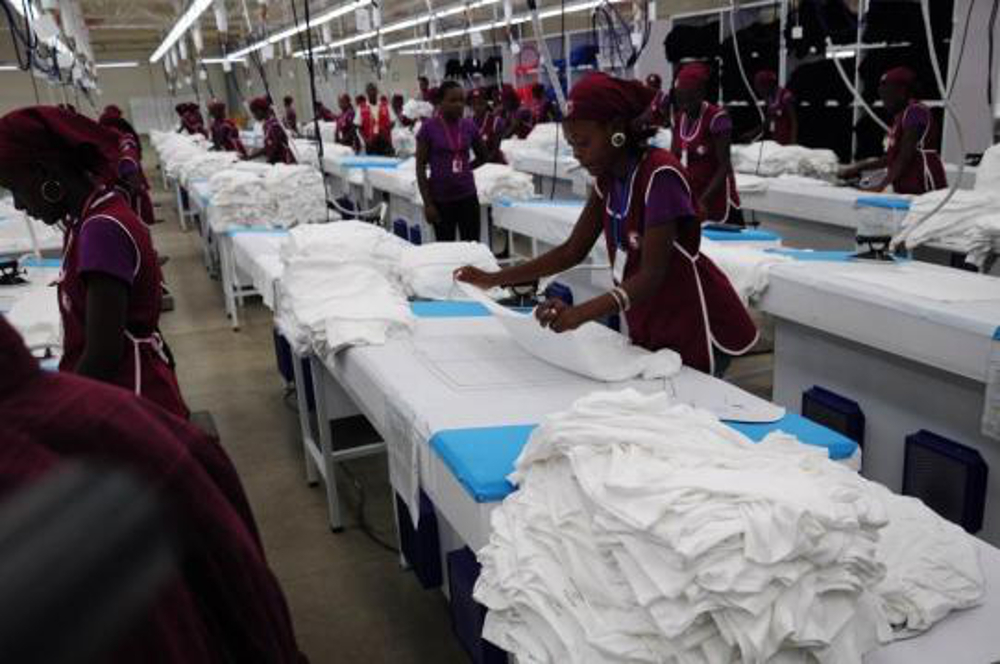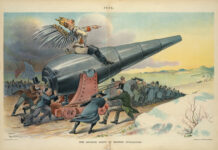When you travel to Jamaica, some resorts will provide you with a sunshine guarantee. If a single day passes when you never experience the deliciously hot sun on your skin, you will be rewarded with a free night’s additional stay.
Such a promise of paradise—of eating fresh bananas, para-sailing the waves of azure seas, and lounging on lush, sandy beaches—is what most vacationers envision and even encounter upon their trip to the island nation.
The documentary film Life and Debt (2001) knows this utopia well, but presents it as only one side of Jamaica, the duplicitous front, while slowly unveiling a hidden segment, unknown, and possibly information undesired, to travelers of paradise.
Life and Debt is inspired by Jamaica Kincaid’s non-fiction work A Small Place (1987), from which the documentary draws excerpts of text.
Narrating the documentary, Ms. Kincaid’s voice is measured yet urgent like those pharmaceutical commercials issuing warnings on designer drugs. On the surface, the images in the film sell the beauty of the island, but Ms. Kincaid’s intonation suggests otherwise, as if to say: Do not believe what you see. There is more to the story.
As one might intimate, a veneer surely does lie beneath the sunny skies and pleasant tropical climate of Montego Bay.
While sightseers hold weddings and relax to Bob Marley’s “One Love,” residents of Jamaica watch news casts of civil unrest, protests, food shortages, and violence.
These perils are, in part, a direct result of the Jamaican government’s entanglement with foreign interests—namely the International Monetary Fund (IMF), the Inter-American Bank, and the World Bank—and their entrapment of a stranglehold on the country’s people under the guise of a benevolent globalization.
Jamaica’s IMF Debt
What transfixed Jamaica into a debilitating state was its growing dependence on foreign money.
Former Jamaican Prime Minister Michael Manley served Jamaica as Prime Minister from 1972-1980 and from 1989-1992 before his death in 1997. The fourth leader to hold the highest office in Jamaican government, Mr. Manley provided a context for much of the documentary, including his fateful decision to sign an agreement with the IMF, an agreement which he believes is at fault for the condition of the nation today.
In the documentary, he illustrated the build up to the deal with the IMF and the aftermath of the agreement on the country. Mr. Manley’s assessment of the IMF is woeful like a bidder discussing a deal gone wrong after the ink was dried.
After oil prices rose, Mr. Manley believed Jamaica was in need of large sums of money for overseas bills. Unable to get private bank loans, he turned to the IMF.
Not to be fooled by the cosmopolitan ring to its name, the International Monetary Fund’s original purpose was not international at all; it only aimed to provide capital for the rebuilding of Europe. Now that Europe is rebuilt, the IMF seeks to use capital to secure financial control of the world’s economic market.
Long-term development of any aided country is not the fund’s agenda. Rather it has vested interests in acquiring full interest for its short-term loans and exercises tremendous restrictions on how much and in what contexts national governments can spend on their own citizens.
Most of its plans require countries to: devalue their currency and make foreign currency more expensive; reduce spending on health, education, and agriculture; and import everything from fuel to books, seeds, fertilizers, and medicines—even goods the country can produce itself.
A merciless lender, the IMF intends to decrease a country’s self-reliance on its own resources and shift countries to become dependent upon foreign resources in order to strengthen the trade networks of its member nations. By cutting out local businesses, it can eliminate artificial barriers to trade.
Sadly for so-called beneficiaries of loans, repayment of debt is hardly a guarantee that they will escape their calamitous economic predicaments. The loans rarely undergo a proper reduction. They simply accumulate and balloon.
The Grim Side of Jamaica
A van for tourists, painted in zebra stripes, sails down a paved road known as the Queen’s Highway. The name refers to the royalty of Jamaica’s former colonial master, Great Britain.
Although Jamaica won its independence from Great Britain in 1962, the name still stands, a keen reminder, like the lyrics from Mutabaruka’s song go… “Life and debt, freedom not yet…” that imperial claws have not yet released the island nation from their grip.
Signs that Jamaica remains heavily linked to imperialism of Western nations are apparent in its landscape of American franchises: Taco Bell, Burger King, McDonalds, and Baskin Robbins, to name a few.

Filmmaker Stephanie Black emphasizes how visiting Jamaica is not necessarily a service to the Jamaican economy. For instance, food purchased at most Jamaican resort hotels is supplied by companies in the U.S. city of Miami, Florida.
Even the McDonalds fast-food chain in Jamaica, along with other American companies, do not source their food with local products. McDonalds, for example, does not use meat produced by local beef farmers but instead imports meat from the U.S., although Jamaican meat is less expensive, does not contain cancer-causing agents, and tastes better (even according to McDonalds’ officials).
Indeed, tourism has ways of harming Jamaica. With a sewage system that cannot keep up with the vast numbers of tourists, much waste is emptied into the Atlantic Ocean, for lack of a better alternative.
The new global outlook has also debilitated farming in Jamaica.
At one point, Jamaican farmers were all picking onions. Now there is no market for mass commercial farming, so farmers are primarily relegated to subsistence methods.
Americans, for example, subsidized the Jamaican government’s purchase of American milk powder, leaving workers in the Jamaican dairy industry unable to sell their fresh milk. Soon the prices of fresh milk exceeded the prices of powdered milk at the local markets.
With little spending money, Jamaicans opted to purchase imported powdered milk, while local farmers were left to pour gallons of expired milk—the life span of fresh milk is only a couple of days—down the drain. Now most of the country’s once thriving milk industry is shut down.
Meanwhile, the U.S. turns away products yielded by Jamaican farmers, alleging that these products do not meet quality standards.
The U.S. also aims to stifle Jamaican trade across borders besides its own.
While controlling over 95 percent of the banana market from U.S.-owned plantations like Dole, Chiquita, and Del Monte in South and Central America, the U.S. still petitions to control 100 percent of the market, declaring unconstitutional and discriminatory and attempting to reverse the Lome’ agreement that secured Jamaican bananas unfettered distribution in the UK market following the end of colonialism.
In addition, foreign companies exploit Jamaican labor in Kingston’s Free Zone.
Theoretically, and conveniently so, the Free Zone is not considered part of Jamaica. Technically never in effect having “touched the shores of Jamaica,” companies, including Hanes, Brooks Brothers, and Tommy Hilfiger, employing workers in the Free Zone operate without controls of Jamaican law. Although their materials are assembled in Jamaica, these companies are not liable to pay income tax to the Jamaican government. To compensate Jamaican workers, the American companies shell out a paltry 30 US dollars for every 5 days of full-time work.
Initially, Free Zones in Kingston, Jamaica were designed to decrease unemployment, at least that was the claim, when jobless rates reached particularly low levels during the 1980s.
Now the US regularly declares they cannot get Jamaicans with the needed skill levels, so they fire Jamaicans and hire Chinese laborers. One segment in the documentary showed 800 Chinese workers living in camp situations near the Free Zone while they were employed through the Asian East Ocean Company.
While shareholders are satisfied with the cheaper production, the losers in this arrangement are everyday workers. Companies do not allow for unionization of workers and put them under constant surveillance.
The predicament facing Jamaicans is not isolated to solely effect small nations. American workers in the U.S. who protest for fair working conditions and shun being undercut by cheap imported labor experience these same circumstances.
Life and Debt—Who Is Responsible?
Following increased violence and social unrest from high insecurity and lack of employment, the prison industrial complex in Jamaica multiplied from 120 guards to almost 2,000.
Jamaica is saddled with over 4 billion US dollars in debt to finance companies.
A new generation has inherited these troubles. And most members of this group point fingers of blame to the IMF.

Generally, the IMF provides recommendations that will aid the organization, as the primary investor, in making more money. But these recommendations will only cripple the country receiving the loan with the goal of making it eternally indebted to the grantor.
Making a deal with the IMF is no doubt swimming against a torrential current. There is little hope of return unless the entire stream is abandoned. With the stroke of the pen, the country is as good as down stream with the flow of Western interests.
However, whether the IMF does so by guile is a matter worthy of debate.
Filmmaker Stephanie Black, along with author Jamaica Kincaid, implicitly suggests that the people’s hands were tied. Jamaicans were blindsided by the agreement, which in a matter of years, completely took over and flattened the local economy.
Yes, there is a thing called fine print. It might be fine in that the meaning is difficult to decipher, but it is transparent in that it is printed and can be deciphered, if only through the most painstaking of examinations.
Former Prime Minister Michael Manley reflects wisely, in a string of belated thoughts, upon the colonial crisis of finance. The most valuable question at hand does not concern the amount of capital, but what kind of capital is coming in?
Private capital cannot come in to help with a country’s education, agriculture, health, or self-sustenance, but only to generate more money for its own ends.
The agenda of unilateral globalization with Western products available for consumption in the farthest corners of the earth has such ends for monetary gain. The ultimate goal, nevertheless, is to have Baskin Robbins’ 31 ice cream flavors reach one world, as its slogan pronounces, to have Western companies and products grace the stage of non-Western televisions in order to eventually drain their wallets.
Globalization’s success is thus best characterized as a zero sum game, and local industries, therefore, suffer when the global beast prepares to feast.
What the west would call an achievement, the rest would call a devastation of their traditional and local cultures. Nonetheless, this is the path where the world is heading when our democratically elected leaders deceive their local communities of today, and their children and grandchildren of centuries ahead, in exchange for a few measly million dollars and perhaps a condominium with a 24-hour doorman in the South of France or New York City.
German politician Horst Kohler, head of the IMF from 2000-2004, plays the recognizable villain in the documentary. He is the scapegoat for the thousands of Jamaicans displaced from their work and livelihoods, the talking head that infuriated viewers agree should be ordered directly to the guillotine.
In a monotonous drone, Mr. Kohler discusses how to make his globalization better for all. Wearing an arrogant smirk betrays his words, it doesn’t take long to realize he is the snake in the grass offering the luminous, forbidden apple.
Former Prime Minister Manley recalled: “They are fattening a few people at the expense of a whole culture that took years to build up and was destroyed with the stroke of a pen.”
Yet perhaps the filmmakers place too much criticism on Kohler and the IMF, who only presented a document that the Jamaican Prime Minister and his executive committee allegedly perused and willfully signed.
Is it a greater transgression to offer up the pen or to use its ink to execute the deal?
Though both sides cannot easily be removed from Jamaica’s fate today, it holds true that only one side must labor to bestow a sunshine guarantee, not just upon its frequent travelers, but also upon the nation’s citizens.
Watch Life and Debt online.











Thanks! Really! Thanks for writing so clearly and so selflessly. If only Africa and the Diaspora had only 10 of you!
This is the best report I have read in years about the Jamaican financial chaos with the IMF. Clearly, it had to take more than 5 years to see any meaningful explanation, in text, of what is happening in Jamaica. Thanks Nefetiti.
Maybe the day Jamaicans would stop concentrating on running around in circles and start writing and reading books there will finally be real change!
The IMF, World Bank, are all slave owning institutions – nothing more, nothing less!